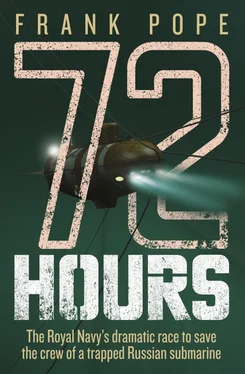With any luck this backup plan would not be needed. If AS-28 could get enough positive buoyancy, she should have a good chance of breaking free and coming straight up.
For 40 minutes the arguments had gone back and forth between the UK team and Podkapayev, and between him and the command ship. All that while, AS-28 hung in the monitor of the control cab in front of the team. Her silent bulk was swaying slightly in the current while a gentle snow of sediment drifted downwards around her. She looked like a tomb.
At last word came that the backup plan had been accepted. The order to blow the tanks would be given, and if AS-28 failed to rise on her own, then Scorpio would come back for a towline. Until then they needed to monitor what happened. After a few minutes of discussion with Gold and Nuttall, they decided to pull Scorpio back around the end of the array, just within visual range of AS-28 ’s striped hull, but not close enough to get tangled in any lines should she move. A minute later Scorpio was in position, the umbilical out of the way, with Nuttall holding her in mid-water.
Gold nodded to Riches.
‘OK, we’re in position. Tell them to blow the ballast,’ Riches said to the interpreter.
Podkapayev knew what was coming and already had the radio up by his mouth. As he relayed the order to the command ship, his eyes were glued to the screen. If the bathyscaphe didn’t move now it was a very bad sign. The seconds ticked by. Nothing happened. Word came over the radio that the command had been delivered, but that no response had been received. Up until now, all orders and requests had been answered. Now there was silence. AS-28 just hung there. There was no other movement, just a funereal silence. As the seconds passed with no sign of life from the submersible, their hearts began to sink. They were too late.
Sunday, 7 August
SS + 71 h 45 mins
04.15 UK – 07.15 Moscow – 16.15 Kamchatka
AS-28 , 210 metres beneath Berezovya Bay
Captain Lepetyukha was up off the floor, propped against the wall of the aft compartment. All of them were breathing heavily, lungs trying to fill with oxygen and flush carbon dioxide but only managing to flood their senses with the rancid mix of vomit, urine and excrement. Gennady Bolonin relayed to him the order given by the surface commander that they should blow their ballast tanks and surface, and saw the Captain stir. Bolonin urged caution. He knew exactly how unstable the submersible he’d helped design was. They didn’t know for sure that all lines had been cut. If one remained snagged on their hull, hidden from the British ROV by the bulk of the array’s floatation tank, it could easily tip them off balance with disastrous results.
‘We must secure everything absolutely,’ said Bolonin. ‘Only when this is done can we start to blow, and even then we must use great caution.’
Moving with numbed slowness, the men began trying to lash down anything that might move. Before long the buzz of the underwater telephone sounded through from the forward chamber. The watchman answered, and a few moments later his voice came through the hatch. ‘Surface want to know what is happening. They say they have given us a command and yet we do not surface.’
Bolonin could see the Captain reacting, his military training urging him to follow orders, blow the tanks immediately and break for the surface. Bolonin looked Lepetyukha in the eye.
‘We must not rush this,’ he said.
If the submersible was still caught, they could end up like a balloon on a string, held upside down while heavy equipment crashed down on top of them amid a rain of battery acid.
With everything as secure as they could make it, Bolonin positioned himself in the front compartment. He nodded to Belozerov, who started slowly turning a valve. An initial hiss turned into a deafening roar as air blasted from high pressure bottles into the ballast tanks. Magnified by the cylindrical hull, the noise was like an explosion.
Sunday, 7 August
SS + 71 h 47 mins
04.17 UK – 07.17 Moscow – 16.17 Kamchatka
Surface rescue fleet, Berezovya Bay
All eyes were boring into the main screen showing the view from Scorpio’s front camera. Podkapayev, Nuttall, Gold and Riches were leaning forward, peering into the murky image. Scorpio was as far away as possible while still being within visual range of AS-28 ’s striped hull. The gentle swaying of the submarine and the continual adjustments that Nuttall was making to keep Scorpio steady were hypnotic. Gold felt like they’d been waiting for more than 30 minutes already, even though it had only been two. Riches was staring so hard he could feel his eyes drying up, and he had to force himself to blink.
Something seemed to be shifting on the screen. It was hard to tell if it was the striped hull moving upwards or the camera moving downwards, but suddenly they realised that the faint white stripe had disappeared. Riches erupted at the same time as Podkapayev, shouting and pointing at the screen.
‘She’s gone!’ Riches shouted, but Podkapayev had already bolted, pushing past behind him and on to the deck.
‘Vzblivayet! Vzblivayet!’ he was yelling. ‘It’s coming up!’
Peering into the swirling murk of the screen, the grey-brown bulk of the end of the array was discernible, but there was no longer a submersible attached to it. They burst out after Podka payev and on to the deck. The whole crew surged towards the port side and began scouring the featureless surface of the sea. This was the moment they’d all been waiting for. Holloway pulled out his camera to catch the momentous moment when the stricken craft broke the surface.
The burst of excitement was immediately followed by silence. Not a calm, soft silence, but a tense, sharp expectation that sliced through the background throb of the ship’s engines. The wind had died away, leaving the day supernaturally calm, sunlight slipping from the low, rolling waves in great slabs. The scattered armada of rusting civilian and naval vessels swayed like giant, irregular metro nomes. Around the fleet every person knew the order had been passed and the submersible should be on its way up.
Tatiana Lepetyukha stood on the flying bridge of the Alagez , having been transferred there from KIL-27 during Scorpio’s repair. She was scarcely able to breathe as she squinted out over the placid surface. She clutched at her faith as though it were the only thing keeping her alive. Alongside her, the Defence Minister, Sergei Ivanov, also stared out across the blank water, his face a mask. The political nightmare of the Kursk backlash cannot have been far from his mind. And although this was only seven sailors and not 118, Ivanov had no doubt that if he failed here the cost would be high.
Nothing moved on KIL-27. The dogs, sensing the change in the atmosphere, had stopped barking. Russian sailors gathered with British and American rescuers at vantage points on the port deck, wherever equipment allowed a clear view of the sea. Heads slowly rotated as each scanned the surface with increasing incredulity. With every passing minute, the clarity of the day got more oppressive. Where was AS-28 ?
Sixty miles away in Petropavlosk, Yelena Milachevskaya held her twin daughters close. She knew that the rescue robot had gone back down to the seabed, and the operator had told her that there only remained a single cable to cut. A blanket of silence seemed to cover her house too, muffling the insistent sound of the television news and its coverage of the unfolding events. In the next room, Slava’s father sat bolt upright at the kitchen table, staring at the screen.
Читать дальше












